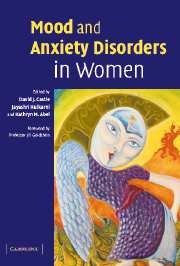Book contents
- Frontmatter
- Contents
- Contributors
- Preface
- Foreword
- 1 Pubertal development and the emergence of the gender gap in mood disorders: A developmental and evolutionary synthesis
- 2 Borderline personality disorder: Sex differences
- 3 Substance use and abuse in women
- 4 Anxiety disorders in women
- 5 Posttraumatic stress disorder in women
- 6 Domestic violence and its impact on mood disorder in women: Implications for mental health workers
- 7 Depression in women: Hormonal influences
- 8 Anxiety and mood disorders in pregnancy and the postpartum period
- 9 Pharmacological treatment of anxiety and depression in pregnancy and lactation
- 10 Bipolar affective disorder: Special issues for women
- 11 Mood and menopause
- 12 Anxiety and depression in women in old age
- Index
Foreword
Published online by Cambridge University Press: 13 August 2009
- Frontmatter
- Contents
- Contributors
- Preface
- Foreword
- 1 Pubertal development and the emergence of the gender gap in mood disorders: A developmental and evolutionary synthesis
- 2 Borderline personality disorder: Sex differences
- 3 Substance use and abuse in women
- 4 Anxiety disorders in women
- 5 Posttraumatic stress disorder in women
- 6 Domestic violence and its impact on mood disorder in women: Implications for mental health workers
- 7 Depression in women: Hormonal influences
- 8 Anxiety and mood disorders in pregnancy and the postpartum period
- 9 Pharmacological treatment of anxiety and depression in pregnancy and lactation
- 10 Bipolar affective disorder: Special issues for women
- 11 Mood and menopause
- 12 Anxiety and depression in women in old age
- Index
Summary
Depressive and anxiety disorders pose a major public health problem with substantial economic and social burden. As this volume discusses, women have an almost 2-fold risk of these disorders compared to men, a difference that starts in childhood or early adolescence and persists into adulthood. Further, depressive and anxiety disorders have been associated with the development and progression of various forms of physical disease, suggesting the associations of these psychiatric disorders with physical health in general. Thus, understanding the epidemiology and pathophysiology of these disorders, and particularly for women, has important implications for attenuation of suffering worldwide.
In this volume, Drs. Castle, Kulkarni and Abel have gathered multidisciplinary experts, along with themselves, to summarize the current literature on a broad spectrum of topics related to depressive and anxiety disorders in women. This ambitious work not only covers sex differences in mood and anxiety disorders per se, but also in disorders or conditions to which they are related, such as borderline personality disorder (Chanen), incidence and consequences of domestic violence (Warburton and Abel), and substance use disorders (Gerada and colleagues). It is very helpful for investigators in the field to have one volume into which all these data are gathered. Further, there is useful clinical information regarding treatments for these disorders and their interactions with hormonal status in women.
Several neuroendocrine systems have been implicated in the development, prognosis, natural history and treatment of mood and anxiety disorders, including the hypothalamic-pituitary-adrenal (HPA), - gonadal (HPG), and -thyroid (HPT) systems.
- Type
- Chapter
- Information
- Mood and Anxiety Disorders in Women , pp. xv - xviPublisher: Cambridge University PressPrint publication year: 2006

